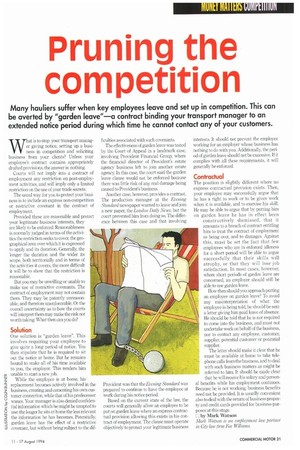Pruning the competition
Page 21

If you've noticed an error in this article please click here to report it so we can fix it.
Wnat is to stop your transport manager giving notice, setting up a busiess in competition and soliciting business from your clients? Unless your employee's contract contains appropriately drafted provisions, the answer is: nothing.
Courts will not imply into a contract of employment any restriction on post-employment activities, and will imply only a limited restriction on the use of your trade secrets.
The usual way for you to protect your business is to include an express non-competition or restrictive covenant in the contract of employment.
Provided these are reasonable and protect your legitimate business interests, they are likely to be enforced. Reasonableness is normally judged in terms of the activities the restriction seeks to cover, the geographical area over which it is expressed to apply and its duration. Generally, the longer the duration and the wider its scope, both territorially and in terms of the activities it covers, the more difficult it will be to show that the restriction is reasonable.
But you may be unwilling or unable to make use of restrictive covenants. The contract of employment may not contain them. They may be patently unreasonable, and therefore unenforceable. Or the overall uncertainty as to how the courts will interpret them may make the risk not worth taking. What then can you do?
Solution
One solution is "garden leave". This involves requiring your employee to give quite a long period of notice. You then stipulate that he is required to sit out the notice at home. But he remains bound to make all of his time available to you, the employer. This renders him unable to start a new job.
While the employee is at home, his replacement becomes actively involved in the business, creating and cementing his own customer connection, while that of his predecessor wanes. Your manager is also denied confidential information which he might be tempted to use: the longer he sits at home the less relevant the information he has becomes. Potentially, garden leave has the effect of a restrictive covenant, but without being subject to the dif
ficulties associated with such covenai The effectiveness of garden leave was tested hy the Court of Appeal in a landmark case, involving Provident Financial Group, where the financial director of Provident's estate agency business left to join another estate agency. In this case, the court said the garden leave clause would not be enforced because there was little risk of any real damage being caused to Provident's business.
Another case, however, provides a contrast. The production manager at the Evening Standard newspaper wanted to leave and join a new paper, the London Daily News, but the court prevented him from doing so. The difference between this case and that involving
Provident was that the Evening Standard was prepared to continue to have the employee at work during his notice period.
Based on the current state of the law the courts will generally allow an employee to be put on garden leave where an express contractual provision allowing this exists in his contract of employment. The clause must operate objectively to protect your legitimate business interests. It should not prevent the employee working for an employer whose business has nothing to do with you. Additionally, the period of garden leave should not be excessive. If it complies with all these requirements, it will generally be enforced.
Contractual
The position is slightly different where no express contractual provision exists. Then, your employee may successfully argue that he has a right to work or to be given work when it is available, and to exercise his skill. He may be able to argue that by putting him on garden leave he has in effect been constructively dismissed, that it amounts to a breach of contract entitling him to treat the contract of employment as being over, and to damages. Against this, must be set the fact that few employees who are in enforced idleness for a short period will be able to argue successfully that their skills will atrophy, or that they will lose job satisfaction. In most cases, however, where short periods of garden leave are concerned, an employer should still be able to use garden leave.
How then should you approach putting an employee on garden leave? To avoid any misinterpretation of what the employee is being told, he should be sent a letter giving him paid leave of absence. He should be told that he is not required to come into the business, and must not undertake work on behalf of the business, nor to contact any employee, customer, supplier, potential customer or potential supplier.
The letter should make it clear that he must be available at home to take telephone calls from the business, and to deal with such business matters as might be referred to him. It should be made clear that he will receive his salary and personal benefits while his employment continues. Because he is not working, business benefits need not be provided. It is usually convenient also to deal with the return of business property and credit cards provided for business purposes at this stage.
U by Mark Watson
Mark Watson is an emplopnent taw partner in City law _firm Fox Williams,














































































